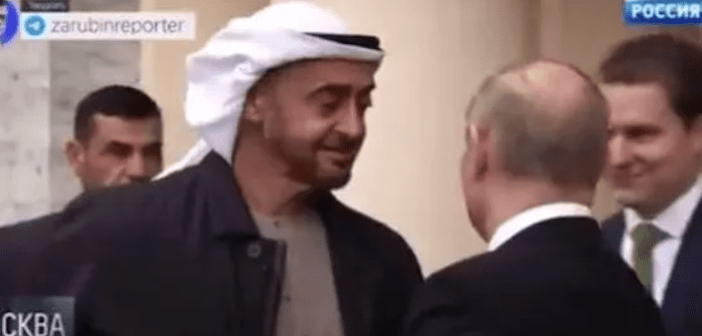President of the United Arab Emirates Federation, the Ruler of Abu Dhabi created a surprise two days ago by traveling to Russia for a meeting with President Putin. His goal ? Laying the groundwork for a mediation plan with Ukraine concerning, in particular, the Zaporizhia nuclear power plant. A way, also, for the Gulf country to raise its status on the international scene.
On energy issues, as well as on the war in Ukraine, Gulf countries, at odds with the Biden administration, are moving away from the traditional alignment of their diplomacy with the positions of the American ally, and towards a more nuanced position placed under the sign of independence and non-alignment. The theoretician of this “new non-alignment” is none other than Mohammed ben Zayed (MBZ), the Ruler of Abu Dhabi, who was elected President of the Federation of the United Arab Emirates on May 14, and whom the New York Times had designated, already in 2020, “the most powerful of Arab leaders”.
This October 11, MBZ created a surprise by traveling to Saint Petersburg, Russia, where he met at length with President Vladimir Putin. On the menu: bilateral issues related to the common strategy to be adopted within OPEC + (Organization of Petroleum Exporting Countries) to stabilize the hydrocarbon market. It was also, above all, a question of a discreet but audacious Emirati mediation concerning the war in Ukraine. According to a source who followed the MBZ-Putin meeting closely, the main objective was to “lay the groundwork for a mediation plan regarding the war in Ukraine”. A three-pronged plan: a proposal to secure the Zaporizhia nuclear power plant. A concrete offer relating to the exchange of prisoners of war. And finally, a project for dialogue between Moscow and kyiv with a view to a de-escalation that could eventually lead to peace talks.
A strict Non-alignment
According to the same source, the Emirati president “shared with Putin the precise points of view of the Ukrainian authorities on all these topics”, which suggests that Abu Dhabi must have consulted with kyiv before the MBZ-Putin meeting. As for the Russian reaction, the source reports that “Vladimir Putin welcomed the progress made by the Emirati mediation, particularly with regard to the file of prisoners exchanges” and “listened with interest to the presentation made to him of the Ukrainian positions on the different aspects” of the Emirati mediation while “expressing the wish to see the efforts undertaken by the Emirates going ahead on all the issues mentioned”. By acting as intermediaries between kyiv and Moscow, the Emiratis are seeking to qualify their position on the crisis in Ukraine, by displaying more neutrality. A sine qua non for effective and credible diplomatic mediation.
While the Saudi big brother keeps to claiming a brand new diplomatic independence from the United States, after decades of systematic dependence, the Emirates intend to go further on the path of non-alignment. Abu Dhabi aims to become an active intermediary on the international scene. A way of consolidating its diplomatic influence – acquired, in particular, since the Abraham Accords with Israel, in 2020 – which has enabled it to establish itself as a major and essential political power in the Middle East. Obviously, the stakes for Abu Dhabi also include prohibiting its Turkish and Qatari rivals from monopolizing the role of mediators in the crises and conflicts which are tearing the region and the world apart.
Published on October 13, 2022

